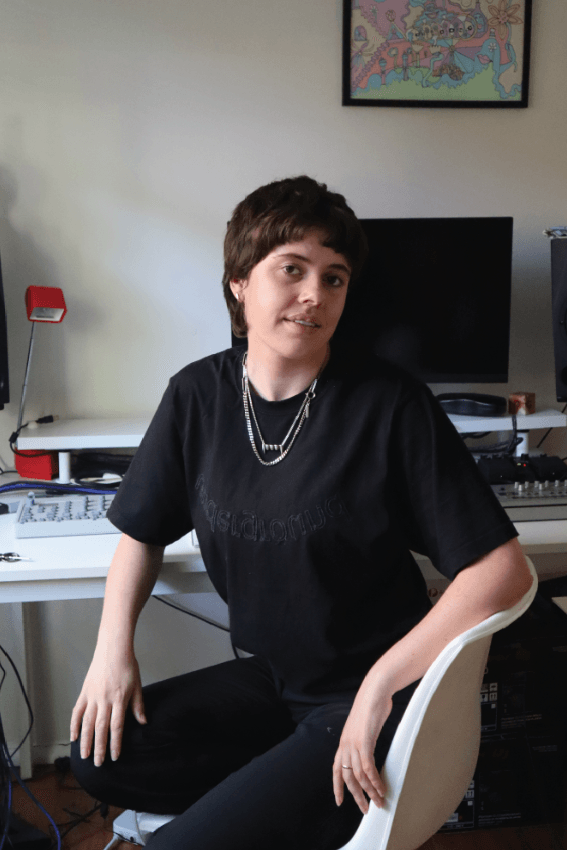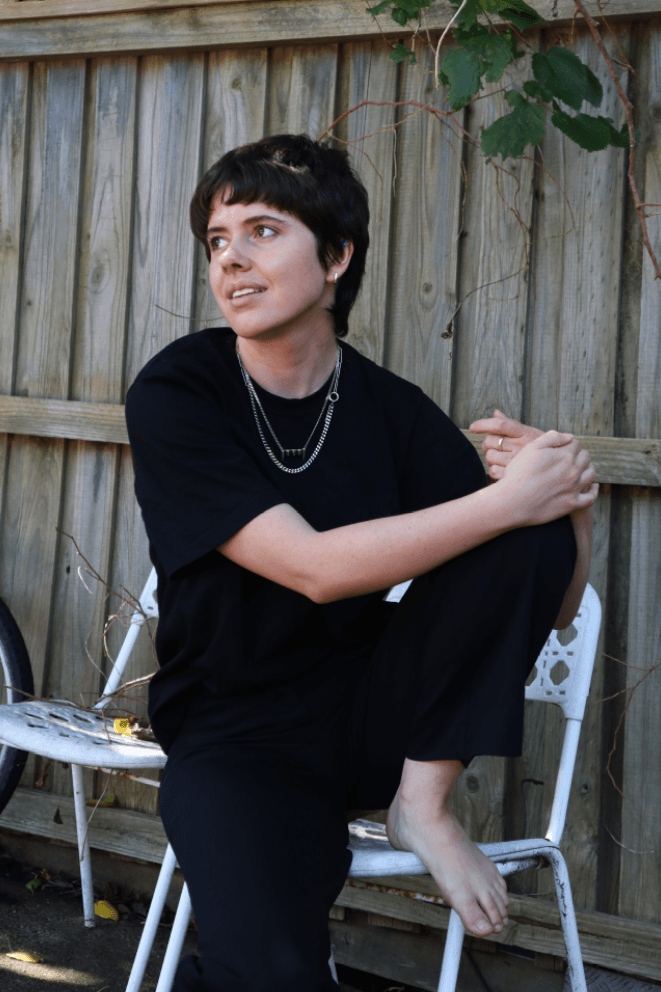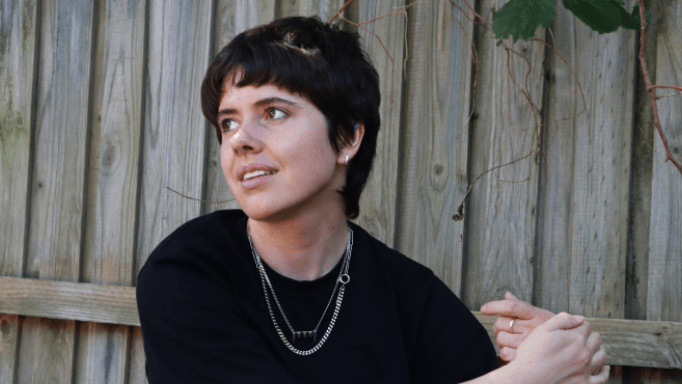Andy Garvey is a notable woman of many feats. She is an individual with exceptional drive and determination, having continuously brought vitality to Sydney’s nightlife and music scene. She’s an unstoppable force with her multifaceted abilities as a radio presenter, DJ, music producer and avid tomato-eater. I was lucky enough to sit down with her in the studio to delve deeper into her experiences of navigating around the industry, her relationship to dance music and the importance of supporting one’s community to succeed.
KZ: Amidst the chaos of 2020, what helped bring you out the other end of the tunnel? Were there any projects that were inspired by your time in iso?
AG: 2020 was definitely difficult. I was meant to live
overseas for a long period of time and was planning heaps of shows and had multiple tours booked. So, having that slowly get cancelled was really difficult and made it hard to engage with music. But, I definitely found hobbies outside of music that ended up having a very positive impact on my time. I got really into running, to get out of the house and feel empowered by moving your body. I also got really into plants, like fostering a garden, looking after things. My morning routine is still very much: get up, make a coffee, check every single plant, make sure it's happy. Caring for something like that became a very important part of my routine.
Music came in waves. Because I didn’t feel super creative a lot of the time, I put a lot of energy into the label that I run — Pure Space. So, being able to give other people opportunities and work creatively with other artists was definitely a really solid thing that made me feel connected to music, while I personally wasn’t feeling super creative myself.
KZ: Growing up in Canberra, how did you navigate yourself around the music scene? What influenced or drew you to dance music?
AG: Growing up in Canberra was very much small-town energy, but I didn’t have a reference to realise that at the time. It felt very safe and there was definitely a bit of a music scene. I had a few friends throw parties at places like Transit Bar and Trinity Bar. Even though the shows that happened there were quite small, sometimes there would be a headliner who I was really excited for, playing to 30 people. You would have this sort of intimate community that was excited by music. You could also warm up for your favourite DJs. I wanted to understand the music industry better and wasn’t actually sure what I wanted to do. So, moving to Sydney made more sense to explore what was out there. There were more record labels up here and bigger events to work for. Getting to Sydney and finding out about FBi Radio was kind of the clincher. That’s where I began.
"I think questioning everything is important to understand more about yourself and what you want from the world and the life that you have."
KZ: FBi Radio has always been a pioneer of promoting local emerging artists and music to amplify independent culture in Sydney. How large of a role do you believe FBi plays in our local culture?
AG: I think it’s quite enormous. The model that FBi runs off — 50% Australian music and 50% of that being from Sydney — is very rare. Most stations might have a quota of Australian music, but to have it that rigid and to have all the presenters being aware of that, is very specific to FBi. They have a really open-door policy with making connections with new artists. The big tracks program that they run is amazing for that, and has had heaps of artists from Western Sydney come through. They have a day, once a month, where you can meet with the music director and bring your tracks in as an independent artist. I think that is also amazing. They also listen to every single track that comes through the music inbox. If you are making music, it can be picked up really quickly. And, I think having a Sydney music show that is on every night of the week brings a lot of opportunity. I think the main thing is that not many stations have that structure and accessibility.
KZ: Alongside radio-presenting at FBi, you were also coordinating an annual program called Dance Class which allowed young female DJs to gain industry advice through a set of workshops. Could you please elaborate on what the project is about and what it meant to you?
AG: That project was actually first initiated by a friend of mine, Avani Dias, who now hosts Triple J’s Hack. She brought the idea to the then program coordinator. They reached out to me to see if I wanted to help structure the program. I eventually took the reins and am very thankful for being able to do it. I think the program and how it’s put together — with the workshops and the mentorships, and being able to DJ at your first party, functions effectively to develop new artists. There have been some artists, like Ebony Boadu, who came through that program and is now on Triple J. Lauren Hansom was booked for Dekmantel. So, there’s these big artists that have come through FBi’s Dance Class, which is amazing. A lot of people who are promoters and bookers, will refer to that program to see the next gen of artists. Helping these young artists navigate themselves around specific questions, like if someone books you, how much you should be charging, information about the industry that you can’t just Google, is very much part of ‘Dance Class.’


KZ: You have transported many of us into your intergalactic universe through ‘Pure Space’. What prompted this project and was this a long-standing dream of yours?
AG: It definitely was a dream of mine since I was a teenager to have a record label, but I just knew no artists and didn’t even know how to conceive starting a label. When I finished high school, I was obsessed with Future Classic — the big independent Australian label. I ended up interning with them just as I was finishing uni and stayed on for a while. It was definitely impactful on how I understood the inner workings of a label. I discovered the importance of giving value to artists, to give them a platform, to sell music, to make sure it’s visually appealing and reaches as many people as possible. Having that back-end knowledge to drive how I wanted to run a label was really important. The managing director at the time, Anna Burns, was very influential on managing the financial side of it. With every project she would ask “How can we make this, so it always breaks even?” I think being that discerning over those kinds of things at the time, has meant that I can try as hard as I can to create value for artists, while not constantly losing money; which is very easy when you’re running a small label.
KZ: You also mentioned that you were inspired by ancient alien theories and the altered state of consciousness. What about the elusive and the intangible captures you?
AG: I was really deep into quasi-conspiracy theories and ancient alien theory. I had to actually pull myself out of how deep I was in it, because you can just keep going. I’m definitely a spiritual person in that kind of way — I really like questioning everything. I think questioning everything is important to understand more about yourself and what you want from the world and the life that you have.
KZ: Did it influence your music at all?
AG: I think allowing myself to be creative has definitely been a part of it. To give yourself the space and time to create is sometimes really hard to do and I didn’t necessarily come from a very creative family. So, feeling like that was purposeful took a little while. Also, calling myself an artist or musician; those words still feel very weighted. I think having that time and space, and allowing creativity to be there, is derived from those, What’s the point? What’s the purpose? kind of questions.
"I think it’s hugely important and I think more and more people are becoming aware of understanding where the music they love was first created."
- Andy on the importance of respecting originals and sources
KZ: What determines if you play a particular record during one of your sets? Is there a certain criterion other than pure subjectivity for selecting what to play at a gig?
AG: Yes. I definitely have an ear for specific dance music. I think dance music is endless. There are endless spectrums between genres and styles. There are also older tracks that are mastered differently, they sound different in the clubs, so you might not want to always be playing old music. Or maybe you do, if you’re wanting a rustier set. There are all these little technical things to think about when you’re picking tracks. I have a refining process of collecting a lot of music, playing it at home, playing it on the radio and finally testing it in a club and kind of knowing how tracks are going to hit. I like feeling the emotion in them, or tracks with the big wow moment. I think my mixing style is very fluid and progresses throughout the set, I don’t do very quick transitions. Or when I do, it’s for a purpose. For most of my mixing, I never want you to think that I’ve played a new track. I want it to always be very fluid.
KZ: With an oversaturated market of streaming culture, there’s so much music available. It is becoming increasingly hard to know what constitutes an original and a remake anymore. What’s your opinion on the importance of roots, traditions, respecting originals and sources?
AG: I think it’s hugely important and I think more and more people are becoming aware of understanding where the music they love was first created. All of dance music is rooted from music created by people of colour. A lot of that, from Detroit and Chicago — and this means understanding the stories behind those artists. If you’re a dance music lover, [it means] understanding the things that came through jazz, soul and funk, led to disco. And disco led to house, and that branched out into electro and techno, also having influence on hip hop. Those connections are really important to understand. I think by particularly being an Australian artist, we have such a distance between our culture, and those unique and old cultures. Acknowledging that these cultures and communities overseas are so inherently ingrained within the music that we love, is the very basic first step. But I also believe that more artists should be crediting their references as well.
KZ: You’ve been an undeniable force within the cultural and musical landscape of Australia, what advice would you give to individuals who follow such aspirations?
AG: One of the things that I say to myself is, and I’ve said to myself through every opportunity that I’ve received, you really need to give to your community, to expect anything from it. I’ve lived by that for many, many years. If someone needs you to volunteer their time, if someone asks you to do or be part of something — saying yes is really important. I think giving up your time and being available for your community, fosters more creativity and opportunities for other people. If you want to be active in the community for a really long time, building those roots and supporting other people is the key.


 -
-